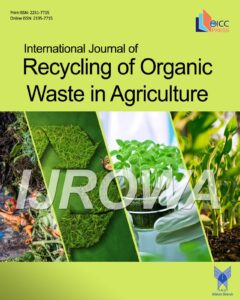Effect of the co-application of olive waste-based compost and biochar on soil fertility and Zea mays agrophysiological traits
Authors
- Youness Bouhia 1, 2
- Mohamed Hafidi 1, 2
- Yedir Ouhdouch 1, 2
- Mohammed El Mehdi El Boukhari 1, 2
- Youssef Zeroual 3
- Karim Lyamlouli * 4
Abstract
Purpose The deterioration of agricultural soil can be alleviated by maintaining an appropriate level of soil organic matter by using organic amendments such as compost and biochar. The aim of this study was to investigate the effects of olive waste-based compost, wood-based biochar and their combination on the chemical and microbial properties of loamy clay soil and the agrophysiological traits of maize.
Method Zea mays was grown under greenhouse conditions for 3 months in pots filled with alkaline soil collected from 0-30 cm depth. The experiment was arranged in a completely randomized design with 5 replicates and 3 treatments: compost-soil [1:10 (v/v)], biochar-soil [1:20 (v/v)] and (1:2)-ratio biochar-compost combination (BCC).
ResultsBiochar addition singly or in BCC increased soil TOC, EC, and pH. Furthermore, adding biochar to compost increased the levels of macro- and micronutrients compared to those under single application of biochar. The soil fertility improved significantly with regard to available phosphorus and potassium, nitrogen, and micronutrients. Single application of biochar had a negative impact on mycorrhizal symbiosis and was statistically insignificant for soil viable cultivable microorganisms.
Conclusion Overall, single application of compost gave the best results in terms of plant growth and soil fertility improvement; thus, a synergistic effect of both amendments was not observed, which could be due to the quantity of the applied biochar and the duration of the experiment.
Highlights
- Using organic amendments such as compost and biochar can improve the fertility of deteriorated soil with low organic matter content.
- Soil Co-application of olive waste-based compost (10%) and wood-based biochar (5%) enhanced soil nutrient status and plant agrophysiological traits.
- Single application of compost resulted in better improvement of soil fertility than dual application of biochar and compost.
- The use of biochar affected negatively mycorrhizal symbiosis and soil viable cultivable microorganisms.



